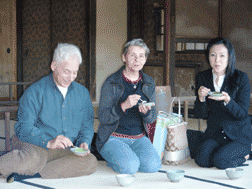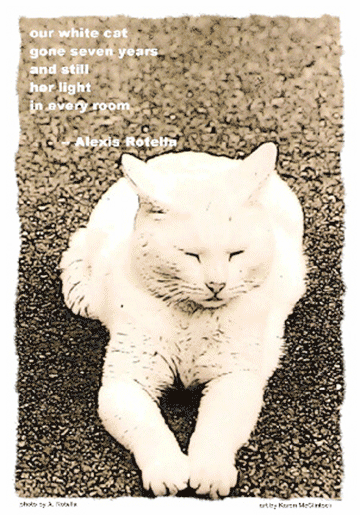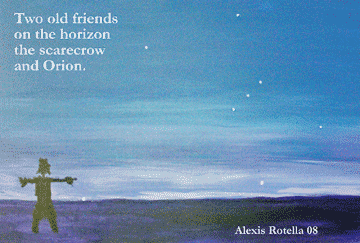|
 |
||||||||
|
|||||||||
|
|||||||||
Listening to Her MusePoet Alexis Rotella won the coveted Japanese Kusamakura grand prize award for
|
|||||||||
 |
Alexis Rotella, center, with husband Robert Rotella and translator Misaki Ta Teo at a Japanese tea house. |
She calls it the Muse. That ancient word is the name Alexis Rotella gives to inspiration, which drops in on her for an afternoon or stays for years. Then, like the wind, the Muse disappears.
“She’s very demanding, very jealous of a person’s time,” says Rotella, whose Muse brings her tiny Japanese-style poems called haiku, tanka and senryu. “She wants me to do nothing but write for long periods at a time, including when I’m trying to sleep.”
The Muse’s demands paid off last year, winning the Arnold acupuncturist and nutritionist a grand prize in the 12th annual international Kusamakura Haiku Competition. Judges chose Rotella’s haiku about a fishing boat arriving safely back to shore over some 700 other entries — from poets in Argentina to Serbia to New Zealand and beyond.
near dusk —
sound of the last
fishing boat
Those eight simple words won Rotella some $550 and a trip to Kumamoto City, Japan, where she finally explored the culture that’s lured her from halfway round the globe for over four decades.
From Italy to Japan
A petite, peaceful artist with silver hair and a deliberate demeanor, Rotella, 61, has reveled in Japanese poetry for 35 years. Asian rhythms first caught her ear as she researched her undergraduate thesis, on Zen Buddhism, at Drew University. The 17-syllable haiku form spoke worlds to her.
“I love the brevity of it all, the imagery and how powerful just a few words are, versus a long poem,” Rotella says. “Haiku is very good for people, especially in America because we have a very short attention span.”
Her heritage is Russian, but she claims Japanese karma. Their poetic tradition gave form to her experience. “Anything that you go through in your life — a sad or horrible experience — if you can extract some morsel out of it, in poem form, it was worth the experience,” she says. “It’s nice to be able to say yeah, I experienced that, I’m not the only one, so it has a way of bringing people together.”
Perhaps it was karma that helped her win the coveted Kusamakura grand prize award. The annual competition is a big deal in Japan, with three days of celebration featuring poets revered as national treasures and other prizes for Japanese-only categories. Rotella won the only category open to foreigners.
The prize-winning words came to her some 30 years ago in Italy. While walking at dusk, she heard the fishing boats return.
“A lot of fishermen lost their lives at sea,” she explains. “You’d see widows looking out over sea at dusk. There’s a certain satisfaction when you know someone is coming home.”
The haiku was rejected by a magazine, but Rotella never lost faith in it.
In Kumamoto, on Japan’s southern-most island, Rotella and her husband were the only Caucasians.
Still, Japan felt like home.
“I felt like this was a place I belonged,” says Rotella — despite its differences from what she’d imagined.
“I thought you could still go to an old-fashioned teahouse,” she says. “But the teahouses are more like Starbucks now.” She found peace and tradition in Japanese gardens, some dating to the 14th century.
While in Kumamoto, Rotella learned that her haiku spoke to Americans, too. Her other entry — about a blues singer — placed third in the Professor Richard Gilbert award, named for an American professor who lives in Japan and teaches at Kumamoto University.
The Terms of the Art
Sinking deep
into winter
the blues singer’s voice
“The Muse just dictated that one,” says Rotella, who was inspired by her 1960s image of a man surrounded by rubble from the riots in Washington, D.C.
“I could see the deep blues singer getting deep inside of himself, trying to find meaning,” she says.
Of the half-dozen forms of Japanese poetry, best known — and the genre that won her prizes last year — is haiku. Traditionally, haiku consist of three lines of five, seven and five sound syllables. Brevity rules out adjectives and adverbs.
“It’s like a capsule full of energy, a snapshot that grabs you,” she says. “There’s a lot of emotion holding up the image.”
Rotella, who calls herself a poetry maverick, favors senryu, a similar form that rises not from nature but from human nature.
Hanging onto
his mother’s skirt,
the little cowboy.
Tanka — traditionally five lines — is more liberal in subject and word form. Rotella penned the tanka Elvis in Black Leather 12 years ago:
After my father’s funeral
I remove the shroud
from the t.v. set
and let Elvis in black leather
break my heart

The shrouded television is a Slovak tradition of mourning. She turned on the set and saw Elvis “looking like a Greek Adonis. It was a way to grieve after holding in my emotions.”
Rotella’s new specialty is combining poetry with photos or illustrations, in forms called haiga (haiku) and taiga (tanka).
“The possibilities of combining poetry with photographs or sketches could go on into infinity,” she says. She’s inspired by photographs or artwork to write haikus and inspired by her words to make accompanying art.
Haiku Digital and Global
The Japanese have crafted their poems for centuries. In periods in Japanese history, Rotella says, a candidate couldn’t be considered for public office unless skilled in poetry and calligraphy. A woman might write a tanka to her beloved, gaining clues to his personality and character through his five-line response.
“It’s all about development and character,” she says.
The traditions live on in modern Japan.
“It’s still common for someone in a corporation to write to someone else [in tanka], and for that person to respond” in kind, Rotella says.
She matches wit with poets around the globe in a form called renga, or linked poetry.
“There’s a whole community of us all over the world, always in contact to a point where it can be very competitive — it’s like tennis games,” she says of the creative volleys writers lob by email.
No subject barred from renga; Rotella favors writing on the foibles of people.
She also takes creative liberties with her renga. After a Californian suggested renga focused on particular themes, Rotella and a fellow poet invented their own sub-genres. In colorenga, every line must focus on the same color: lavenga reveals things that are purple; a redenga line demands scarlet subjects.
This wordplay shoots over the World Wide Web’s highways and byways, ringing new age variations on an old world art form. In another linkage of ancient and modern, Rotella enhances her haiga and taiga with digital imagery. The modern Muse calls Rotella to work in Photoshop.
“We’re living in 2008, so it’s important to use these technologies that are available to us and bring this form up to date,” says Rotella, who’s bringing an ancient art into the 21st century through online galleries.
Like physical galleries, online galleries organize art into shows on the Internet. There are not enough haiga venues for prolific writers, Rotella says, so she and other poets display work in online galleries.
Being a 21st century poet “is not an easy road,” she says. “You can’t expect to make a living being a poet.” But for Rotella, poetry makes living grand.
Read more at www.alexisrotella.com.
|
Current Issue \\ Archives \\ Subscriptions \\ Clasified Advertising \\ Display Advertising |
